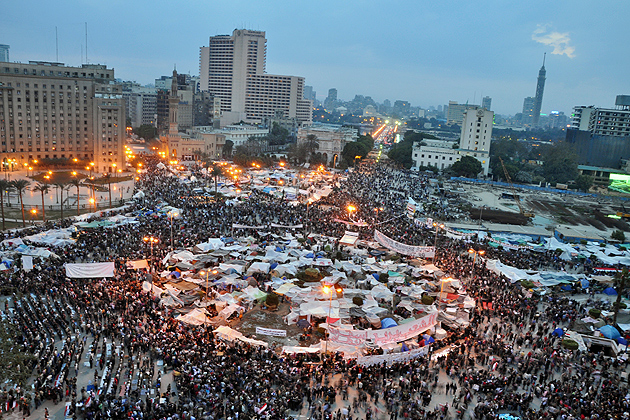In Hot Topics posts, UConn experts comment on current events and issues unfolding in the news.

As tumult in the Arab world continues, a year after it first erupted, what have we learned? Middle East expert Jeremy Pressman, who holds the Alan Bennett Honors Professorship in Political Science in the College of Liberal Arts and Sciences, reviews the situation.
Now that we are at the first anniversary of the Arab Spring, how would you characterize its results so far?
Uncertainty continues to characterize the Arab uprisings, as it has from the outset. Few revolutionary periods are settled in a year – just look at the American, Chinese, French, or Russian revolutions. So year two, like year one, will be a year of questions. Take Egypt. The parliamentary elections ran successfully. But that just begs the next questions: What will the Muslim Brotherhood do with its parliamentary victory? With what parties will it ally? How will it govern? Will the Supreme Council of the Armed Forces transition to genuine civilian oversight?
Will democracy and human rights prevail, or are the outcomes still fluid?
If people naively thought democratization would be a cakewalk, they have surely sobered up by now. The change of this past year has been breathtaking and violent all at the same time. Perhaps 5,000 have died in Syria since the uprising started in March, and it is not over yet. Repression has won the day in Bahrain thus far [watch this award-winning documentary on Bahrain]. Even in Egypt, held up globally as the symbol of regional change, some Egyptians joke that they got rid of the dictator but kept the dictatorship. Many liberal activists, bloggers, and journalists in Egypt have been killed, tortured, raped, and arrested over the past year as Egypt’s armed forces weigh whether and how much to relinquish political power. Meanwhile, Tunisia is moving forward at a quicker and relatively more positive pace.
Do you expect Bashar al-Assad to remain in power? Why has Syria been able to contain protests that have toppled other powerful dictatorships and military regimes?
I do not expect Assad to stay in power. But remember, I had no idea this wave of uprisings was coming; prediction is hazardous. For sure the Assad regime has been weakened by international sanctions, displeasure from many Arab states and Turkey, defections from the armed forces, and months of non-violent and increasingly violent protests. A civil war [for a discussion of the conflict in Syria as a civil war, see the blog, The Monkey Cage] is underway. If Assad did not have the sectarian card to play – he is a minority Alawite and has raised the possibility of an anti-Alawite, anti-Druse, anti-Christian bloodbath should he be deposed – he would be even weaker. Many brave Syrians have fought to free themselves.
Why was the U.S. caught so off-guard by the uprisings? With all of our interests in the Middle East, shouldn’t we have been less surprised?
The U.S. was caught off-guard because everyone was caught off-guard, including the people who organized the protests. Few if any of the Egyptians who organized the first of this wave of protests on Jan. 25, 2011 expected then-President Hosni Mubarak to actually fall just weeks later.
Should the U.S. be worried about the emergence of Islamists in countries where dictators once repressed them?
Political Islamists are less likely to be as supportive of U.S. interests in the region. So, yes, the United States government should be worried. But how long was the United States going to try to keep the lid on the region? This is a wave of popular protest against a range of social, economic, and political grievances; I doubt the United States could change the overall direction much if it tried. The time has come to let Islamism run its course. Judge new Islamist leaders by their actions, and do not confront and pressure so much that external powers drive them into a corner. How are reformists ever going to try to win over the public sphere if there is no public sphere (e.g. Qaddafi’s Libya) or if the public arena is ruled with an iron fist (e.g. Assad’s Syria or, to a large extent, Mubarak’s Egypt)? Opening up politics is fraught with danger, but it is a necessary step to move toward more open societies.
Pressman has a guest posting on The Monkey Cage, a political science blog, titled “Will the U.S. Restrain Israel on Iran? Unlikely.”
On Tuesday, March 27, Pressman will host a public forum at UConn, titled “The Arab Uprisings and the Changing Global Order,” where panelists from around the nation will offer their views. The forum will take place in Student Union Room 330, from 9 a.m. to 4:30 p.m.



